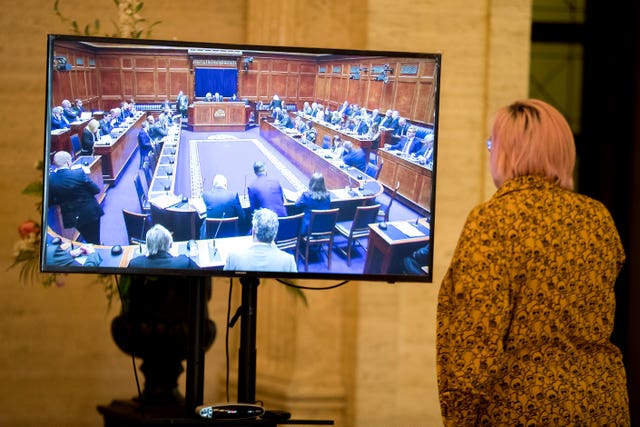
The devolved parliament in Belfast has rejected the Government’s EU withdrawal plan.
The position was agreed without dissent following a near three-hour debate in Northern Ireland.
It was one of the first substantive acts of business since the assembly was restored earlier this month following the powersharing deal.

Its two largest parties are the DUP and Sinn Fein, who oppose the Prime Minister’s Brexit deal for different reasons.
Northern Ireland has been unable to speak without the authority of elected ministers throughout most of the debate over Brexit due to the three-year suspension of the devolved institutions.
Sinn Fein deputy first minister Michelle O’Neill said: “We must work together with common cause to overcome the challenges that have been imposed on us by Brexit.
“This Assembly has not given its consent to the British Government to legislate on our behalf.”
The decision by assembly members will not affect the Government’s plan to leave the EU at the end of the month.
The Assembly has voted not to give consent to the British Gov legislating on our behalf on Brexit
A majority of our people, MLAs & MPs oppose Brexit
It presents the most profound challenges to our island in a generation
Brexit is not orange or green & it‘s not in our interests pic.twitter.com/hmOFHkSa31
— Michelle O’Neill (@moneillsf) January 20, 2020
Northern Ireland voted in favour of Remain in the 2016 EU referendum, but there was a significant body of mainly-unionist opinion in favour of Leave.
The DUP is largely pro-Brexit, but opposes Prime Minister Boris Johnson’s plan over fears it could impose customs checks on goods travelling between England, Scotland or Wales and Northern Ireland.
DUP leader and Stormont First Minister Arlene Foster urged the Prime Minister to “deliver on his promise” of unfettered access to the Great Britain market and ensure that “competitiveness is maintained”.
She said the Brexit deal posed “significant challenges for Northern Ireland” and called on Assembly members to “take a stand” to show that it was “back in business” and will not be overruled by the Government.
Nationalists and businesses are keen to ensure the Irish land border remains open and frictionless, and are mostly in favour of remaining within the EU bloc.
There have been fears leaving could encourage dissident republican violence or re-open the debate over Irish unity, since the Republic of Ireland remains a member state.
Ms O’Neill said an EU pledge which would see Northern Ireland regain EU membership in the event of unification was a key factor.
“That has changed the context of the conversation and I think there is a very positive conversation under way now which is irreversible, I think that’s where the whole political debate is,” she said.
Nationalist SDLP leader Colum Eastwood attacked the Government’s record on Brexit.
He said: “They do not care about people here, they don’t care about people in Scotland, and they are determined to go on with the madness that is this Brexit.
“Next week we will be dragged out of the European Union against our will, against the will of people here and people in Scotland. That’s why it’s important that we’re here, that’s why it’s important that we’re rejecting it.”


Comments: Our rules
We want our comments to be a lively and valuable part of our community - a place where readers can debate and engage with the most important local issues. The ability to comment on our stories is a privilege, not a right, however, and that privilege may be withdrawn if it is abused or misused.
Please report any comments that break our rules.
Read the rules here